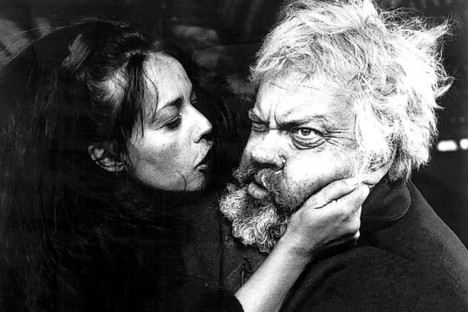 “Jeanne Moreau and Orson Welles in ‘Chimes at Midnight,’ a 1965 Shakespeare-based film that’s recently been restored.” Source of caption and photo: online version of the WSJ article quoted and cited below.
“Jeanne Moreau and Orson Welles in ‘Chimes at Midnight,’ a 1965 Shakespeare-based film that’s recently been restored.” Source of caption and photo: online version of the WSJ article quoted and cited below.
(p. D8) Every great artist, . . . , strives for perfection. In fact, that’s part of what makes them great: They’re never entirely satisfied with anything that they do. The classical pianist Artur Schnabel once remarked that he was only interested in performing music that was “better than it can be performed…unless a piece of music presents a problem to me, a never-ending problem, it doesn’t interest me too much.” This sums up the plight of all serious artists: They lead lives of endless frustration, struggling to reach the top of the hill, then seeing another, higher hill just beyond it.
. . .
Alas, that kind of suffering goes with the territory. The trick, as every artist knows, is not to let it interfere with getting things done. The wisest artists are the ones who finish a new work, walk away and move on to the next project. Whenever a colleague pointed out a “mistake” in one of Dmitri Shostakovich’s compositions, he invariably responded, “Oh, I’ll fix that in my next piece.”
The road to malignant perfectionism, by contrast, starts with chronic indecision. Jerome Robbins, whose inability to make up his mind was legendary throughout the world of dance, was known for choreographing multiple versions of a variation, then waiting until the last possible minute to decide which one to use. Beyond a certain point, this kind of perfectionism is all but impossible to distinguish from unprofessionalism, and Mr. Welles reached that point early in his career. . . .
. . .
Mr. Welles’s problem was that he wanted it both ways. He was a perfectionist who expected his collaborators to sit around endlessly waiting for him to make up his mind–and to pay for all the overtime that he ran up along the way. Simon Callow, his biographer, has summed up this failing in one devastating sentence: “Any form of limitation, obligation, responsibility or enforced duty was intolerable to him, rendering him claustrophobic and destructive.” That’s the wrong kind of perfectionism, and it led, as it usually does, to disaster.
For the full commentary, see:
TERRY TEACHOUT. “The Snare of Perfectionism: When Artists Aim Too High.” The Wall Street Journal (Fri., July 22, 2011): D8.
(Note: ellipsis in Schnabel quote was in original; other ellipses added.)

